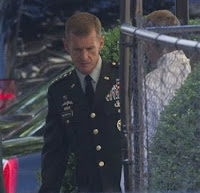 Lying in bed this morning after hitting the snooze button about 4 times, I drifted in and out of sleep while half-listening to the Today Show. This led to some strange dream incorporations where I was sitting with Al Roker in Des Moines, Iowa, while incessant showers of Charmin and Bounty paper products came pouring down on a struggling homeless shelter.
Lying in bed this morning after hitting the snooze button about 4 times, I drifted in and out of sleep while half-listening to the Today Show. This led to some strange dream incorporations where I was sitting with Al Roker in Des Moines, Iowa, while incessant showers of Charmin and Bounty paper products came pouring down on a struggling homeless shelter. Al’s passing-of-the-baton to the news desk woke me from this strange half-sleep, and I began to actually listen to the breaking news on the latest White House controversy. For those of you who may not know yet, war commander General Stanley A. McCrystal and company recently bashed President Obama to a journalist writing an article for Rolling Stone. McCrystal, a man who carries engraved nunchucks and who once took his wife to a Jack-in-the-Box in her formal gown, was perhaps the most powerful man shaping the war policies in Afghanistan. He is said to be rigid and to offer harsh criticism, and has strained relations with many top U.S. officials. He has previously been at odds with the President: after calling VP Joe Biden “Short sighted” and saying his ideas would lead to a state of “Chaos-istan,” President Obama called for his presence at a private and curt meeting aboard Air Force One. Soon after, McCrystal’s evaluation of the war in Iraq was leaked to the press, a move which critics say was meant to bully Obama into sending more troops overseas. McCrystal’s aides also criticized Obama for not seeming to recognize “the guy who was going to run his…war” during a meeting right after Obama’s inauguration.
The Rolling Stones article made McCrystal out to be a kind of Army rock star, and follows his reluctant trip to France to persuade continued support for the war in Iraq. It also included less-than-flattering comments about the president, the vice president, and key government officials by both McCrystal and his core group of aides. After publication of the article, White House spokesman Robert Gibbs said that the president was not at all pleased. McCrystal apologized and said that it was a “mistake reflecting poor judgment and never should have happened.” Following a tense set of meetings, McCrystal was relieved of his command at 1:30 EST on June 23, and will be replaced after a list of candidates is developed by the Pentagon.
So what lessons can we learn from the out-of-favor general?
- The biggest lesson is realizing that it was the matter in which the feedback was presented that got McCrystal fired. Telling a national newspaper that your boss and his top aides are incompetent is a sure-fire way to lose favor in an organization—and possibly your job.
- Remember: context is everything. If you make a loose, offhanded remark, be prepared for it to come back and resurface at the most inopportune time. Make sure the comment does not get taken out of context, and try your hardest to ensure that you explain the situation to your boss or coworker before they hear it from someone else.
- Comments and criticisms to both internal and external sources should be kept specific and without overly flamboyant language—i.e. not saying that you would rather be “beaten up” than go to dinner with coworkers. Instead, keep to concrete language and examples.
- Feedback should be given privately. Coworkers don’t need to know what your other coworkers think of you or your performance. In the daily workplace, this includes sitting around the office gossiping about Brad or Marie for their lack of initiative or their inability to communicate ideas. Don’t tell other people; tell the person the comment is directed towards. It will help the individual improve, and will keep you out of trouble.
Explosive and public comments on someone’s job performance won’t end well for the giver or the receiver. Lets take this as a lesson learned.






